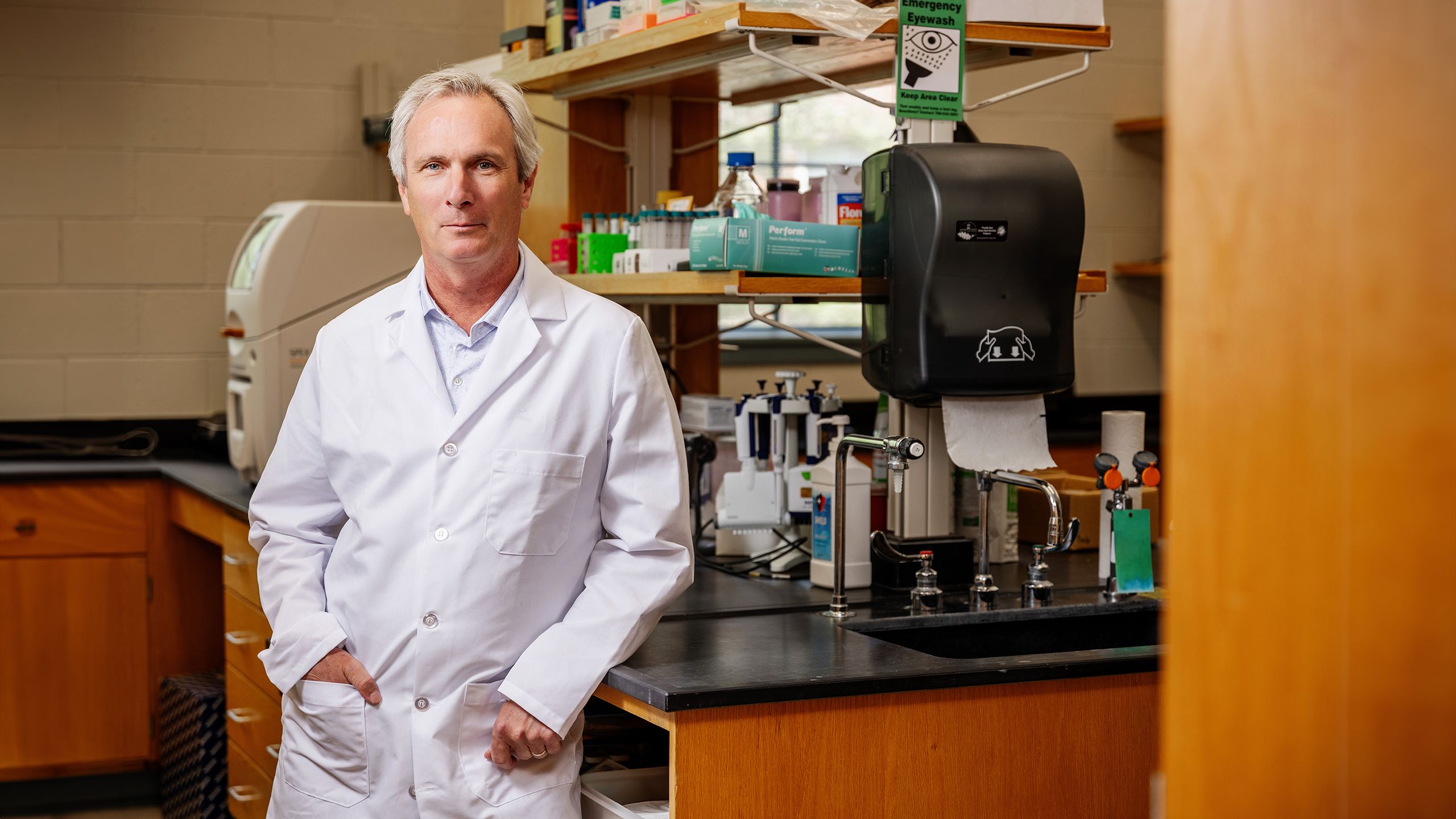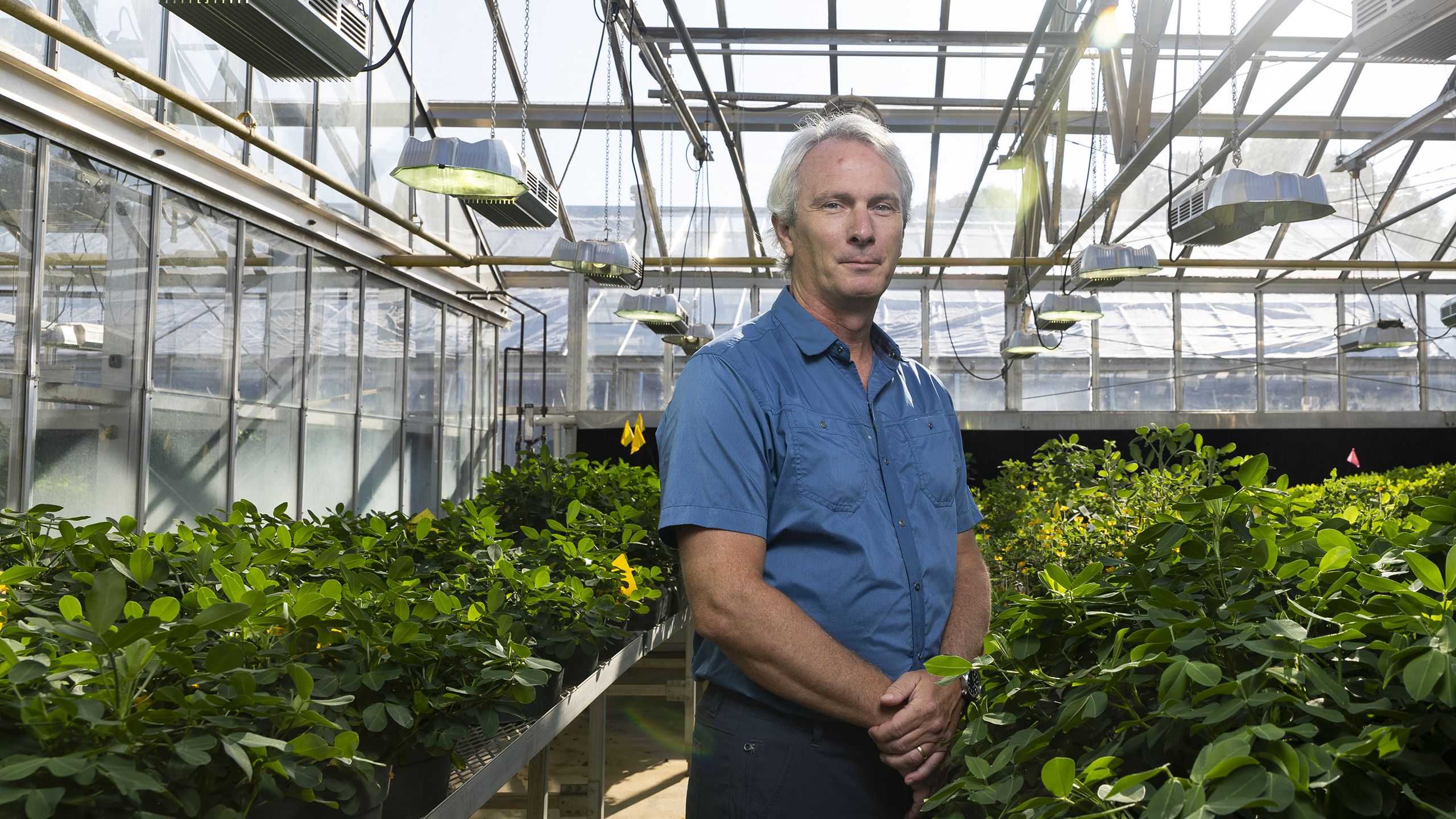
Designing the future of food
How UGA’s Scott Jackson is reimagining crops with synthetic biology
For renowned plant genetics researcher Scott Jackson, returning to the University of Georgia as the inaugural Georgia Research Alliance (GRA) Eminent Scholar in Synthetic Biology is an opportunity to harness technological advancements to increase creativity in agricultural research.
Jackson’s work links plant DNA sequences to their functions to improve the productivity and sustainability of vital economic crops. In his new role, he will use advanced modeling to explore the role of interacting genes in agricultural systems, working from DNA to molecules to entire production systems.
“When designing a product, you consider who it is for and their needs. We want to bring this same design-thinking approach to crops and agriculture. Can we design crops with specific, intentional purposes — like harvesting grain for one use and generating new molecules of value for growers and producers for another?” Jackson said. “We’re trying to integrate advancements from various scientific fields and focus them on agriculture.”
A return with purpose
GRA Eminent Scholars are internationally renowned leaders in the areas of science that are strategically important to the state of Georgia and its research institutions. They are distinguished by the significance of their research discoveries and their potential for commercial application and workforce development. UGA currently has 19 GRA Eminent Scholars.
This is Jackson’s second turn as a GRA Eminent Scholar at UGA. He first came to the university in 2011 as the GRA Eminent Scholar in Plant Functional Genomics and served as a professor in the College of Agricultural and Environmental Sciences for eight years, providing leadership for the university-wide Plant Center and the Center for Applied Genetic Technologies.
Since returning to CAES in September 2024, after a five-year stint with Bayer Crop Science, Jackson has been charged with recruiting a cohort of faculty members to establish a center of excellence in the application of genomic tools for crop improvement.
“Intentional crop design means not just increasing yield and disease resistance, but designing for needs 20 years from now. For example, corn might be used for animal feed — but its stalks and leaves could be engineered to produce precursors for bioplastics or pharmaceuticals. Microbes already do this with engineered biosynthesis pathways. Why not plants?” Jackson asked.
A leading expert in plant genetics whose work focuses on the application of such tools to describe and understand the structure and function of plant genomes for crop improvement, Jackson hopes to duplicate the success of UGA’s Institute for Plant Breeding, Genetics and Genomics (IPBGG) and the promise of the developing Institute for Integrative Precision Agriculture.

Design thinking meets agriculture
“The design process involves asking: What is the optimal strategy? Is it purely breeding, or do we need to edit existing genes, or even introduce entirely new ones? We need to use every tool in our toolbox — not just traditional pathways — to improve crops,” he said. “What do we want this crop to accomplish for growers and downstream users? Then, how do we put the pieces together? If we want a crop to do X and Y, what is the most efficient path to achieve that? Then we can design the breeding, gene-editing and genetics strategies accordingly.”
Initially, Jackson said the focus will be on crops with clear economic returns — soybeans, corn, cotton, canola — but in the future, researchers may explore underused or alternative crops for applications such as double cropping or winter cover crops, which could be added to existing crop systems.
With the evolution of artificial intelligence, Jackson said researchers can use advanced modeling and computational tools alongside recent breakthroughs in genetics to design crops with enhanced precision.
“AI has shown great promise in software development, where developers can now spend most of their time doing creative thinking and AI does the rote coding. Can we do the same in agriculture? Is it possible to increase the creativity and use AI for rote experimentation?” Jackson said. “Instead of relying on traditional trial-and-error experiments, we can simulate and model experiments in code. If something previously had a success rate of 1 in 1,000, we might increase that frequency and efficiency dramatically by using AI-driven design and modeling.”
From genomes to global impact
Jackson said he came back to UGA for three reasons: the faculty in plant biology and agriculture, whom he calls a “real strength of the university”; the administrative support for expanding scholarship to further agriculture in Georgia and around the world; and the university’s “incredible track record of translating fundamental research into products that impact Georgia growers, producers and the state’s economy.
“The opportunity to help drive larger research initiatives that will have a direct impact on agriculture is what drives me and motivated me to return to UGA, a place that I love and hope to make an even better institution,” Jackson said.




